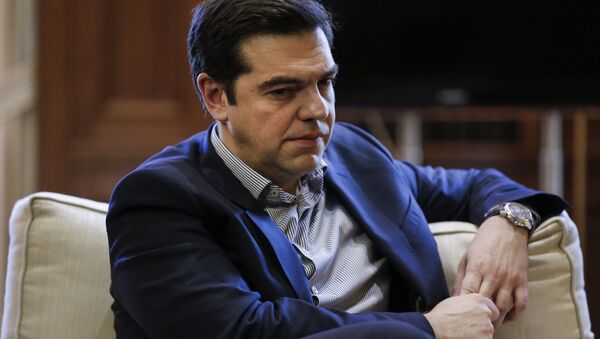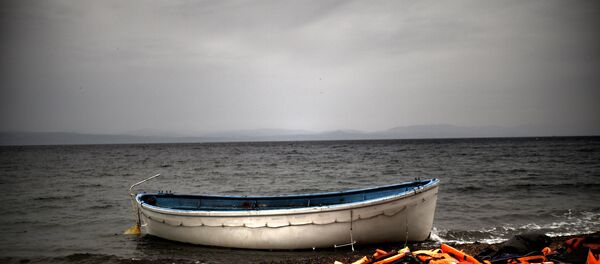Taking a tough stance, Tsipras has threatened to thwart EU decisions made at the next summit if countries do not agreed to share the burden of the incoming migrant flow, warning that he would not allow Greece to become a "warehouse of souls".
"Greece will no longer agree to any deal if the burdens and responsibilities are not shared proportionally," Tsipras told parliament.
The #RefugeeCrisis is an intl problem and must be addressed as such by EU. Greece will not accept unilateral actions. (2/2)
— Alexis Tsipras (@tsipras_eu) February 24, 2016
Critical Situation
Ionnis Tsamurgelis, an economist in Athens, told Sputnik that the current situation in Greece is "critical".
"The situation is very critical in Greece. The fiscal deficit is increasing and the refugee crisis is piling huge pressure on Greece. We have to have help from other European Union countries. But in order to ask for other governments' help to absorb the refugees, the Greek authorities need bargaining power– and bargaining power is very low at the moment," Tsamurgelis told Sputnik.
Greece has been excluded from recent meetings between EU Interior and Justice Ministers in Brussels when Austria and other Western Balkan countries agreed to tighten border controls against Greece, despite increasing numbers of refugees becoming stranded in the southern European country.
Tsipras responded to the decision by Austria to cap the numbers of people allowed applying for asylum or traveling through the country elsewhere saying it was "unacceptable" and "shameful" that many EU countries had failed to sign up to join EU initiatives to tackle the refugee crisis and instead act alone.
Thousands of refugees remain trapped in Greece after Macedonia stopped all Afghans from crossing the border and introduced document and passport checks for all Syrians and Iraqis.
Herculaneum Task
Tsipras’ calls for political consensus on the issue of relocating and resettling refugees have been echoed by Filippo Grandi, head of the UN refugee agency, who has warned that the lack of legal routes for refugees will cause "further chaos and confusion" across Europe.
Greece needs support in helping refugees. Sharing responsibility (NOT closing borders) is the answer. W/ @atsipras pic.twitter.com/YDGY2SAk3W
— Filippo Grandi (@RefugeesChief) February 24, 2016
"I am very worried about the news that we are getting about increasing closures of European borders along the Balkans route because that will create further chaos and confusion. It will increase the burden on Greece which is already shouldering a very big responsibility in managing these people," Grandi said.
The imbalance of responsibility for refugees falling on Greece’s shoulders has also been echoed by Peter Sutherland, UN special representative for international migration, who claimed it was "an outrage".
It is an outrage that Greece has to carry a disproportionate burden in the EU simply because it is situated where it is. No sharing.
— Peter Sutherland (@PDSutherlandUN) February 24, 2016
"Without any control of the refugee problem, the worst scenario would be for more fiscal problems and financial difficulties, Greece removed from the Schengen zone and out of any future negotiations with the Troika," Tsamurgelis told Sputnik.
The European Union has given Greece the Herculaneum task of regaining control of its external borders by May 2016, or face being cut off from the rest of the Schengen zone.



